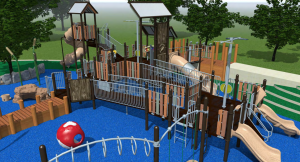
BERLIN – Officials want to hear from the Berlin Parks Commission before setting a list of priority projects.
The Berlin Town Council on Monday voted unanimously to table discussion regarding the town’s annual parks development plan. Elected officials want to hear from parks commission members and review more information about a proposed inclusive playground before setting that as the town’s top priority.
“When it gets to us it becomes political,” Councilman Dean Burrell said. “I would prefer hearing from the parks commission directly as to their wishes associated with these options.”
As the council reviewed the annual parks development plan Monday, Acting Town Administrator Mary Bohlen explained that the Berlin Parks Commission had identified an inclusive playground at Stephen Decatur Park as its top priority as the town seeks grant funding. A skate park study was listed as the second priority.
Bohlen said the development plan was essentially the town’s wish list of park projects.
“This is something that’s in the town code that the parks commission shall submit on an annual basis,” Bohlen said. “This year what we are proposing as a priority project is an inclusive playground in Stephen Decatur Park. This would include removal of most, if not all, of the existing equipment and replacement with one large playground campus.”
She said the skate park study would assess suitable locations and the desire and need for a skate park in town.
Councilman Jack Orris questioned the need for a study.
“I believe that the determination for where a potential skatepark should be should rest with this body,” he said.
Councilman Jay Knerr questioned the fact that the playground was above the skate park as a priority. He noted that fundraising was already underway for the skatepark.
“We could probably get to one quicker than the other one,” he said.
When Burrell said he wanted to hear from the parks commission, Bohlen said the commission had forwarded the council its recommendation—that the playground be listed as the top priority as grants were pursued.
“I believe it was unanimous,” Tyndall said.
He said the priority list would be used as the town sought Community Parks and Playgrounds funding from the state.
“It doesn’t mean we can’t work through the skate park,” Tyndall said. “At this time it’s a little premature to do that. If we determine a location, if we have a clear plan in mind, it could be slated for a future application.”
Resident Tony Weeg, head of the nonprofit that’s been raising money for a skatepark, said the inclusive playground wasn’t suggested by the parks commission but was brought to them by the mayor. He added that a skate park feasibility study had already been completed by Salisbury University’s BEACON program.
“We’ve raised nearly $30,000,” Weeg said. “We’ve done a feasibility study I have sent to the parks commission. I expect that to bubble up to mayor and council.”
He said at this point elected officials simply needed to officially decide on a skatepark location so the nonprofit could continue to apply for grants.
“It’s no secret that I think the space behind the basketball courts at Henry Park would be a fantastic place for a skatepark…,” he said. “At this point, new funding, grant funding—bigger funding sources—are waiting for this body to decide where we should put the park… I’d really love to see some of this funding come as well from the town instead of it just being private stuff.”
Tyndall said elected officials relied on the parks commission to provide input on issues related to parks and that its members should make a location recommendation. He added that he was the one who’d directed Weeg to BEACON.
“I don’t know where you stand on study of a site,” he said.
Weeg said he’d been pushing the Henry Park location for a year and had spoken to engineers and stormwater experts about it.
“Your first step is the parks commission,” Tyndall said.
Burrell asked if the town had the information and specifications for the inclusive playground that would be needed for grant applications. Tyndall said the town had what was needed to create a successful application.
“The idea of what an inclusive playground could look like was modeled in the parks commission agenda,” he said. “It’s purely an example. Because of the size and scope of the project we’d have to go through the RFP (request for proposal) process.”
He said the playground would replace the existing park equipment and would be geared toward kids 5-12.
“The old equipment would need to go,” Tyndall said. “You’ll recall that we had the equipment inventoried and assessed. It’s reaching the end of its useful life. The report we had showed some age on our equipment. It’s still in usable condition, it’s still safe, but we need to start looking at reinvesting in that equipment.”
Burrell maintained that he’d like to hear directly from parks commission members regarding their priorities. Councilwoman Shaneka Nichols agreed and said that even if the playground specifications were conceptual she’d like to see them.
The council voted unanimously to table approval of the development plan until a future meeting.

